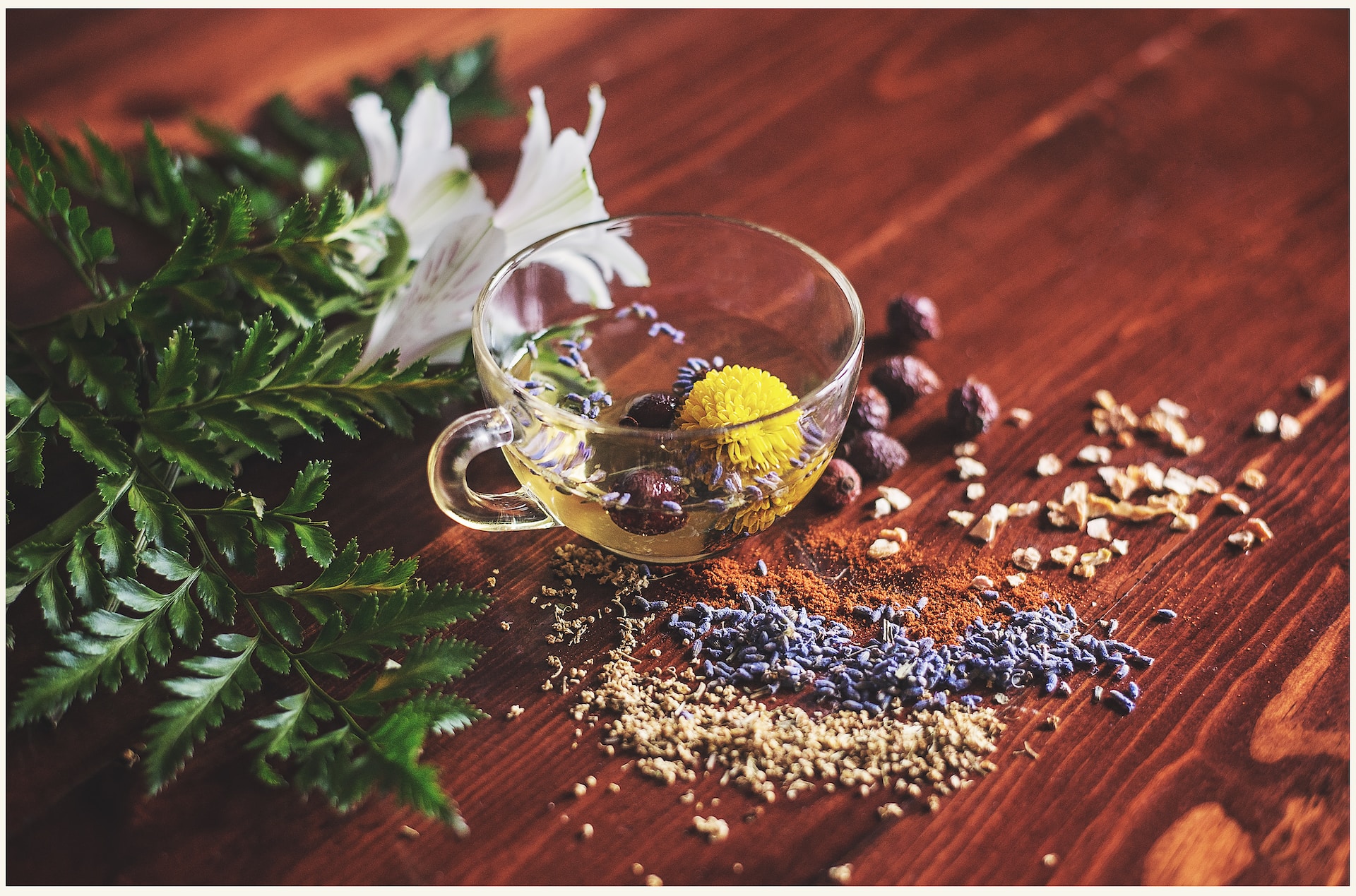❖ Introduction
In a world saturated with chemical-laden beauty products, there has been a resounding call for a return to nature. Consumers are increasingly seeking alternatives that are not only effective but also gentle and sustainable. This shift has given rise to the popularity of herbal cosmetics, which harness the power of natural ingredients to enhance beauty. In this blog, we will delve into the captivating world of herbal cosmetics, exploring their allure and the myriad benefits they offer for our skin, hair, and overall well-being.
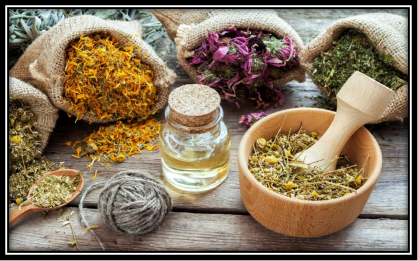
❖ Understanding Herbal Cosmetics:
⮚ Defining Herbal Cosmetics: Introduce the concept of herbal cosmetics, highlighting their distinction from conventional beauty products. Explain that herbal cosmetics are derived from natural plant-based ingredients, such as herbs, flowers, and botanical extracts.
Herbal cosmetics are a category of beauty products that utilize natural ingredients derived from plants, herbs, and botanical extracts. Unlike conventional cosmetics that often contain synthetic chemicals, herbal cosmetics prioritize the use of natural, plant-based components to provide gentle and effective skincare and beauty solutions.
The defining characteristic of herbal cosmetics lies in their commitment to harnessing the power of nature. These products draw inspiration from traditional herbal medicine practices that have relied on botanical remedies for centuries. By integrating plant-derived ingredients, herbal cosmetics aim to offer a holistic approach to beauty that nourishes and enhances the skin, hair, and overall well-being.
Herbal cosmetics encompass a wide range of products, including skincare items such as cleansers, toners, moisturizers, serums, masks, and creams. Additionally, they extend to haircare products like shampoos, conditioners, oils, and treatments. The emphasis is on utilizing natural ingredients with proven benefits to address various skin and hair concerns, while minimizing the use of synthetic chemicals and potential irritants.
These natural ingredients often possess inherent properties that can soothe, moisturize, protect, and rejuvenate the skin and hair. They may offer antioxidant effects, anti-inflammatory properties, moisturizing capabilities, and even antimicrobial or antifungal benefits. Popular herbal ingredients found in cosmetics include aloe vera, chamomile, lavender, rosehip oil, tea tree oil, green tea, calendula, turmeric, and many more.
By opting for herbal cosmetics, individuals have the opportunity to align their beauty routine with their values of sustainability, eco-friendliness, and conscious consumerism. Herbal cosmetics often prioritize ethical sourcing of ingredients, avoid animal testing, and utilize eco-friendly packaging. These products provide an alternative to conventional cosmetics and cater to those seeking a more natural and holistic approach to beauty.
⮚ The Appeal of Herbal Cosmetics: Discuss why herbal cosmetics have captured the attention of beauty enthusiasts. Highlight their gentle and safe nature, minimal use of synthetic chemicals, eco-friendliness, and alignment with the growing trend of natural and sustainable beauty.
❖ The Power of Nature’s Ingredients:
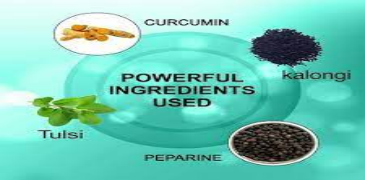
⮚ Harnessing Natural Botanicals: Explore the rich variety of natural ingredients found in herbal cosmetics. Discuss the unique properties and benefits of key ingredients, such as aloe vera for soothing and hydration, lavender for calming and aromatherapy, and turmeric for brightening and anti-inflammatory effects.
⮚ Synergy of Nature’s Bounty: Explain how herbal cosmetics often blend multiple botanical ingredients to create synergistic effects. Emphasize that the combination of various herbs amplifies their individual benefits, resulting in potent formulations that address specific skin and hair concerns.
❖ Nurturing skin with herbal cosmetics:
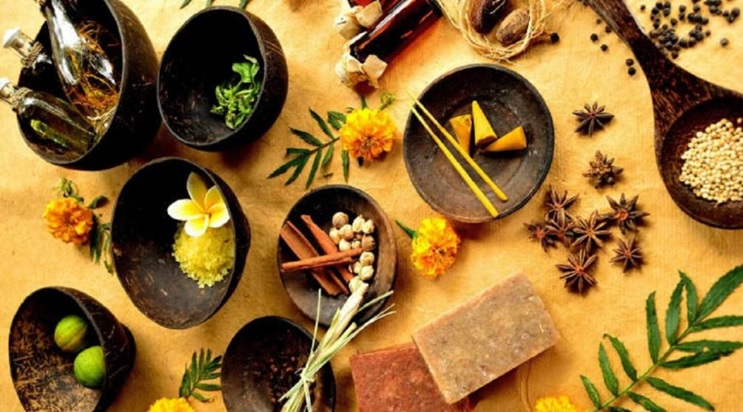
⮚ Gentle Care for the Skin: Discuss the advantages of using herbal cosmetics for skincare. Explore how natural ingredients can nourish, moisturize, and protect the skin without causing irritation or adverse reactions. Highlight examples such as chamomile for sensitive skin, rosehip oil for hydration, and green tea for antioxidant protection.
⮚ Addressing Skin Concerns: Showcasing how herbal cosmetics offer targeted solutions for various skin issues. Discuss how ingredients like tea tree oil combat acne, calendula soothes inflammation, and licorice brightens the complexion. Demonstrate the versatility and efficacy of herbal cosmetics in promoting healthy and radiant skin.
❖ Herbal Hair Care for Lustrous Locks:
⮚ Nurture from Root to Tip: Illustrate the benefits of herbal cosmetics for hair care. Emphasize that natural ingredients can rejuvenate and revitalize the hair, promoting strength, shine, and overall hair health. Discuss examples such as amla for hair growth, hibiscus for scalp health, and coconut oil for deep conditioning.
⮚ Taming Common Hair Concerns: Explain how herbal cosmetics address common hair issues. Showcase how ingredients like neem oil combat dandruff, aloevera soothes the scalp, and henna imparts natural color. Highlight the gentle yet effective approach of herbal haircare products.
❖ Embracing Herbal Cosmetics in Your Beauty Routine:
⮚ Making Informed Choices: Guide readers on how to choose reliable and authentic herbal cosmetics. Encourage them to read ingredient labels, seek certifications, and research reputable brands committed to sustainability and ethical sourcing.
⮚ Create a Herbal Beauty Ritual: Provide practical tips for incorporating herbal cosmetics into a daily beauty routine. Suggest steps such as gentle cleansing, toning with natural floral waters, applying herbal serums or moisturizers, and indulging in herbal face masks or hair treatments. Promote the idea of self-care and enjoying the sensory experience of using herbal products.
-
- Cleansing:
Begin by cleansing your face with a gentle herbal cleanser. Look for cleansers that contain natural ingredients like chamomile, lavender, or rosemary, which are known for their soothing and cleansing properties.
-
- Exfoliation:
Next, exfoliate your skin to remove dead cells and reveal a fresh complexion. Create a herbal scrub by mixing ingredients like oatmeal, powdered herbs (such as lavender or rose petals), and a natural exfoliant like sugar or salt. Gently massage the scrub onto your skin in circular motions, then rinse thoroughly.
-
- Steaming:
Steaming your face can help open up your pores and promote better absorption of herbal nutrients. Boil a pot of water and add herbs like chamomile, rosemary, or mint. Place a towel over your head and lean over the pot, allowing the steam to envelop your face. Steam for about 10 minutes, then pat your skin dry.
-
- Herbal Face Mask:
Apply a herbal face mask to nourish and rejuvenate your skin. Depending on your skin type, you can use different ingredients. For example:
- Herbal Face Mask:
-
-
- Dry Skin: Mix mashed avocado with honey and aloe vera gel.
- Oily Skin: Combine bentonite clay with witch hazel and a few drops of tea tree oil.
- Normal/Combination Skin: Blend yogurt, oatmeal, and a few drops of rosehip oil.
- Apply the mask evenly to your face and leave it on for 15-20 minutes. Rinse off with lukewarm water and pat your skin dry.
-
-
- Herbal Toner:
After removing the face mask, use a herbal toner to balance your skin’s pH and tighten your pores. You can make a simple toner by steeping herbs like rose petals, lavender, or witch hazel in boiling water. Once cooled, strain the liquid and pour it into a clean spray bottle. Spritz the toner onto your face or apply with a cotton pad.
- Herbal Toner:
-
- Moisturization:
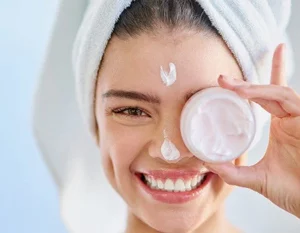
- Moisturization:
Finish your herbal beauty ritual by moisturizing your skin. Choose a herbal moisturizer that suits your skin type. Look for ingredients like aloe vera, jojoba oil, shea butter, or rosehip oil. Gently massage the moisturizer into your skin using upward motions.
Conclusion:
Herbal cosmetics represent a captivating journey back to nature, where beauty meets wellness. With their gentle yet effective formulations, these products offer a harmonious blend of science and traditional wisdom. By embracing herbal cosmetics, we not only prioritize our own well-being but also contribute to the preservation of our planet. So, why not embark on this enchanting voyage of natural beauty? Unveil the secrets of nature and indulge in the allure of herbal cosmetics for a radiant and sustainable approach to personal care at IIMT University, Meerut. At IIMTU you will get the overall knowledge of herbal cosmetics and how to benefit from them. This is why IIMTU is known as the best private university in Meerut U.P.

